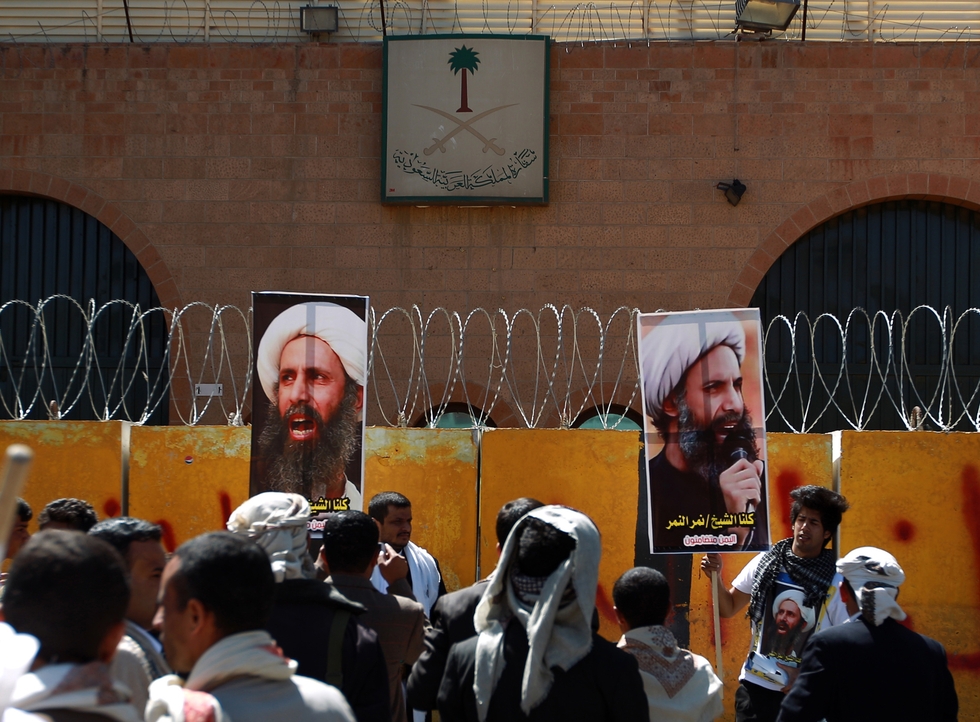Reactions to Saudi execution of prominent Shia cleric

The execution of a high-profile Shia cleric by Saudi Arabia on Saturday has unleashed a torrent of reactions from other countries, groups and family, ranging from anger to sadness to calls for peace.
Sheikh Nimr al-Nimr was executed along with 46 other prisoners who were charged with terrorism counts by the oil-rich kingdom.
Nimr, a prominent leader in the Shia-populated al-Qatif region in eastern Saudi Arabia, played an instrumental role in the protests that broke out in 2011 and 2012, calling for political reforms. He was arrested in July 2012.
Mohammed al-Nimr, al-Nimr's brother, expressed his shock that Saudi Arabia carried out his brother’s execution, but he also called for a “peaceful” reaction.
"Sheikh Nimr enjoyed high esteem in his community and within Muslim society in general, and no doubt there will be reaction,” he told Reuters by telephone. “We hope that any reactions would be confined to a peaceful framework. Enough bloodshed.
"We were expecting and hoping that the voice of moderation and political settlements would prevail," he added.
Mohammed al-Nimr said he hopes that the Saudi authorities will hand over his brother’s body for a speedy burial.
'Overdue process'
A Saudi royal adviser claimed that the country’s decision to implement Saturday’s executions was a sign of “grace and virtue” as features that “distinguish this blessed state”.
Sheikh Saad bin Nasser Shathry, an adviser at the Royal Court, told Saudi Press Agency that the executions were in line with preserving the rights of his country and keeping it “moving despite the determination of those who want corruption on Earth”.
Saudi journalist and commentator Jamal Khashoggi told Middle East Eye that the executions were an "overdue process".
"We the Saudis for quite some time were wondering why the sentencing of al-Qaeda terrorists was taking so long," he said. "I noticed wire stories focused on the Nimr execution and not on the al-Qaeda [members]. Most of the prisoners, with the exception of Nimr and a couple of others, were al-Qaeda terrorists.
"Those criminals did act brutally against innocent civilians [and] they needed to be dealt with, so what happened is, I'm sure, very much welcomed by most Saudis," he added, referencing 2003 Riyadh compound bomb attacks which killed 39 people and were claimed by the group.
Khashoggi went on to say that the execution of Sheikh Nimr was justified.
"It is a clear message to anybody who wants to overthrow the government," he stated. "Nimr openly called for overthrow of the system and allegiance to Wilayit al-Faqih, [Iran's Supreme Leader].
"That amounts as treason by any democratic country," he continued. "[His execution] is not about his view as a Shia; it's about his call to overthrow the government and swear allegiance to a foreign leader."
Fuad Ibrahim, a UK-based Saudi writer and researcher, described Sheikh Nimr's execution as the start of a new, darker chapter between Saudi's Shia citizens and their government.
Criticism from Iran, Iraq
Iran’s foreign ministry condemned the executions and warned that Saudi Arabia woul pay a heavy price for its actions.
“I have no doubt that this pure blood will stain the collar of the House of Saud and wipe them from the pages of history,” said Ayatollah Ahmad Khatami, a leading Iranian cleric. “The crime of executing Sheikh Nimr is part of a criminal pattern by this treacherous family … the Islamic world is expected to cry out and denounce this infamous regime as much as it can.”
Meanwhile, an Iraqi MP said that Nimr's execution was intended to raise sedition between Sunnis and Shias and "ignite the region".
“This action taken by the ruling family procedure is intended to ignite the region and get a new sectarian fighting between Sunnis and Shiites and the creation of a new crisis in addition to the crises in the region,” MP Mohammed al-Saihood told Iraqi television station al-Sumaria.
This echoes Palestinian-Jordanian writer and political analyst Yasser al-Za’atrah, who tweeted that the timing of the execution of Nimr is a political message that Saudi’s confrontation with Iran has reached new levels of escalation and that Riyadh is prepared to “pay the cost at every level”.
The Houthi militia group in Yemen, an offshoot of the Shia sect and which is fighting the government of President Abd Rabbuh Mansour Hadi, condemned Saudi Arabia as violating human rights.
The group, which has been at the receiving end of a Saudi-led coalition campaign of air strikes in Yemen since March 2015, described Nimr as a “holy warrior”.
"The al-Saudi family executed today the holy warrior, the grand cleric Nimr Baqr al-Nimr, after a mock trial ... a flagrant violation of human rights," an obituary on the Houthis' official Al Maseera website said.
Stay informed with MEE's newsletters
Sign up to get the latest alerts, insights and analysis, starting with Turkey Unpacked
Middle East Eye delivers independent and unrivalled coverage and analysis of the Middle East, North Africa and beyond. To learn more about republishing this content and the associated fees, please fill out this form. More about MEE can be found here.




